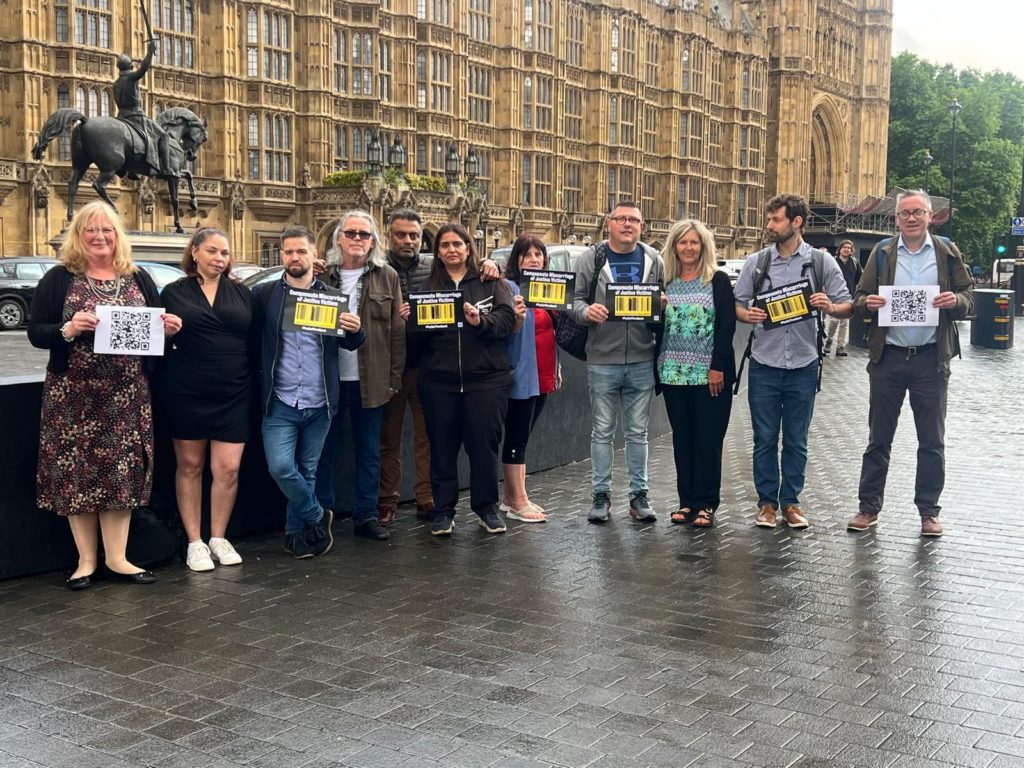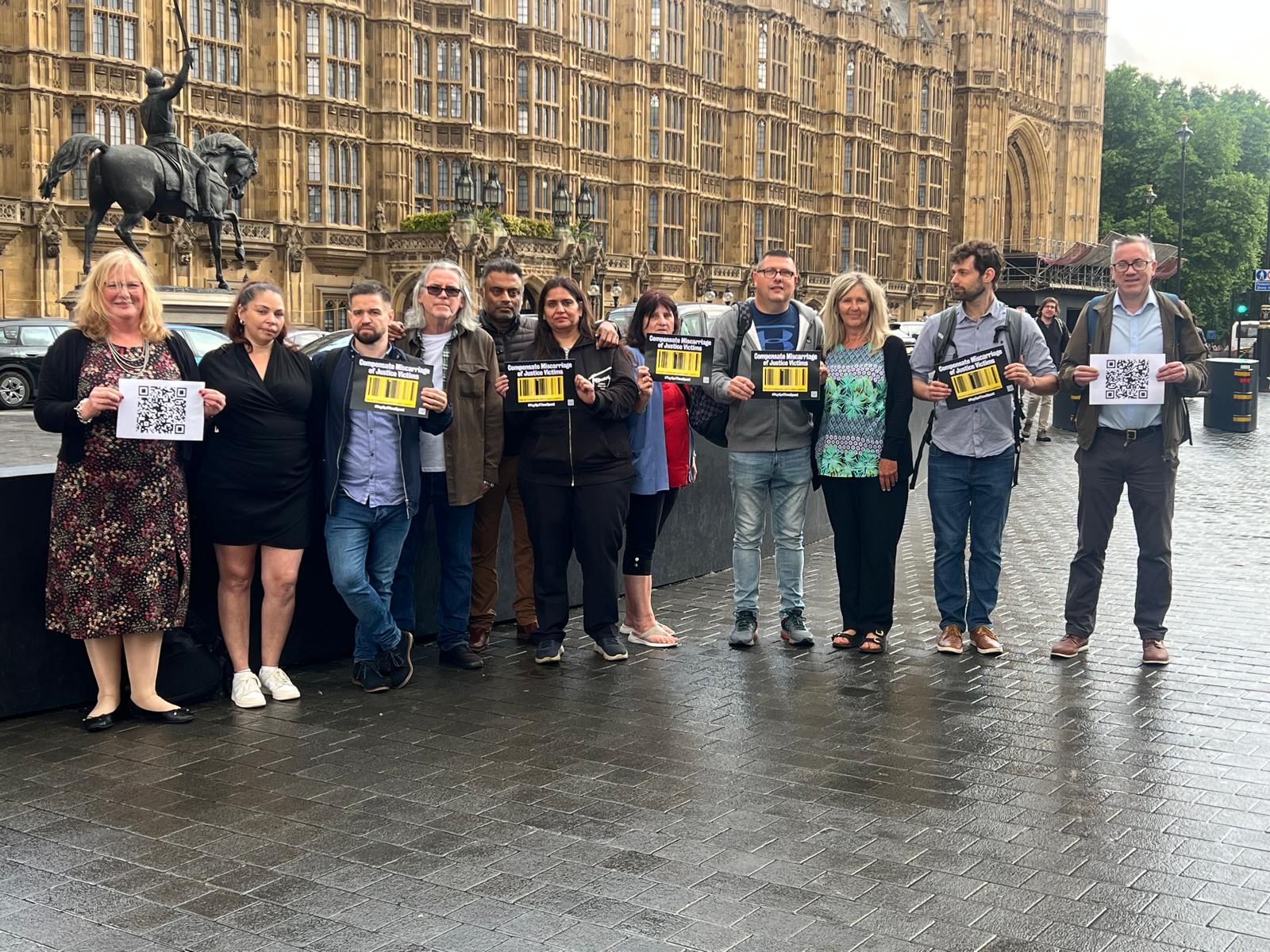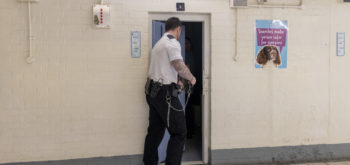A new campaign to scrap the ‘brutal’ miscarriage of justice compensation arrangements has been called ‘eminently winnable’ by a former minister in the government that introduced the legislation. In Prime Minister’s Questions yesterday – the day after the campaign launch – Sir David Davis MP said that the 2014 scheme introduced by ‘my government’ had shut off compensation for 93% of applicants, ‘destroyed’ the presumption of innocence and represented ‘an institutional miscarriage of justice’. He called on Sir Keir Starmer to review the law.
The #PayUp4TimeSpent campaign is calling for the repeal of section 133(1ZA) of the Criminal Justice Act. According to the APPEAL and Justice, the 2014 law created ‘one of the harshest barriers to justice in the UK’. They say: ‘It’s not enough that the courts say they should never have been jailed. They must now prove they didn’t commit the crime — often without access to the very evidence that secured their freedom.’
‘The integrity of the justice system can be measured in the way that you treat the wrongfully convicted,’ said Matt Foot, co-director of APPEAL. ‘And there is no integrity in the system that denies the vast majority of the wrongfully convicted any compensation at all. They are left destitute. That has to change, and it has to change quickly.’
An institutional miscarriage of justice
The former Labour Lord Chancellor, Charlie Falconer, who chaired the event, called the present arrangements ‘horrific’: ‘It’s horrific in the context of a system that prides itself on justice. We are a country and a society the regards playing by the rules and being presumed innocent until proved guilty as being absolutely key things.’
Kim Johnson MP, chair of the All-Party Parliamentary Group on Miscarriages of Justice, backed the campaign. ‘Compensation is really needed to put lives back to together, not that that money ever will… The system isn’t fair and that needs to to be recognized. Justice delayed is justice denied.’
The former Tory minister David Davis called the campaign to reform the legislation ‘eminently winnable’ and was unsparing in criticism of his own government. ‘It was my government, the Coalition government in 2014, that passed this law which basically destroyed the presumption of innocence in British law.’
Sir David continued: ‘How does a private citizen go about proving their innocence? They don’t have the police force to go and find witnesses for them. They don’t have a forensic laboratory to redo the work being done. They certainly don’t have money to pay for it because they’re broke.’ The MP went on to say that the campaign was not about the money because ‘the payment of compensation is a recognition of innocence and of the fact that you have been ill-treated. That the state has not just let you down but the state has done you a serious evil.’
The day after the campaign launch, the MP raised the issue in parliamentary questions. Sir David was holding a copy of the 1999 book Miscarriages of Justice that Keir Starmer co-edited with Clive Walker. The PM said that this was ‘really important issue which I am, of course, aware of’. ‘It is right that the victims of miscarriages of justice can apply for compensation,’ Starmer said and added that he would look into the matter.
93 per cent of victims of miscarriages of justice are refused compensation for their wrongful conviction.
This is an institutional miscarriage of justice, denying victims proper recompense for having their lives ruined.
Today, at PMQs, I asked @Keir_Starmer to put this right 👇🏻 pic.twitter.com/ya8oViBRSL
— David Davis MP (@DavidDavisMP) June 4, 2025
It’s not about the money
At the campaign launch, politicians heard from a number of people who had been wrongly convicted: some had received compensation under the old arrangements and others who had been denied compensation because of the 2014 law change.
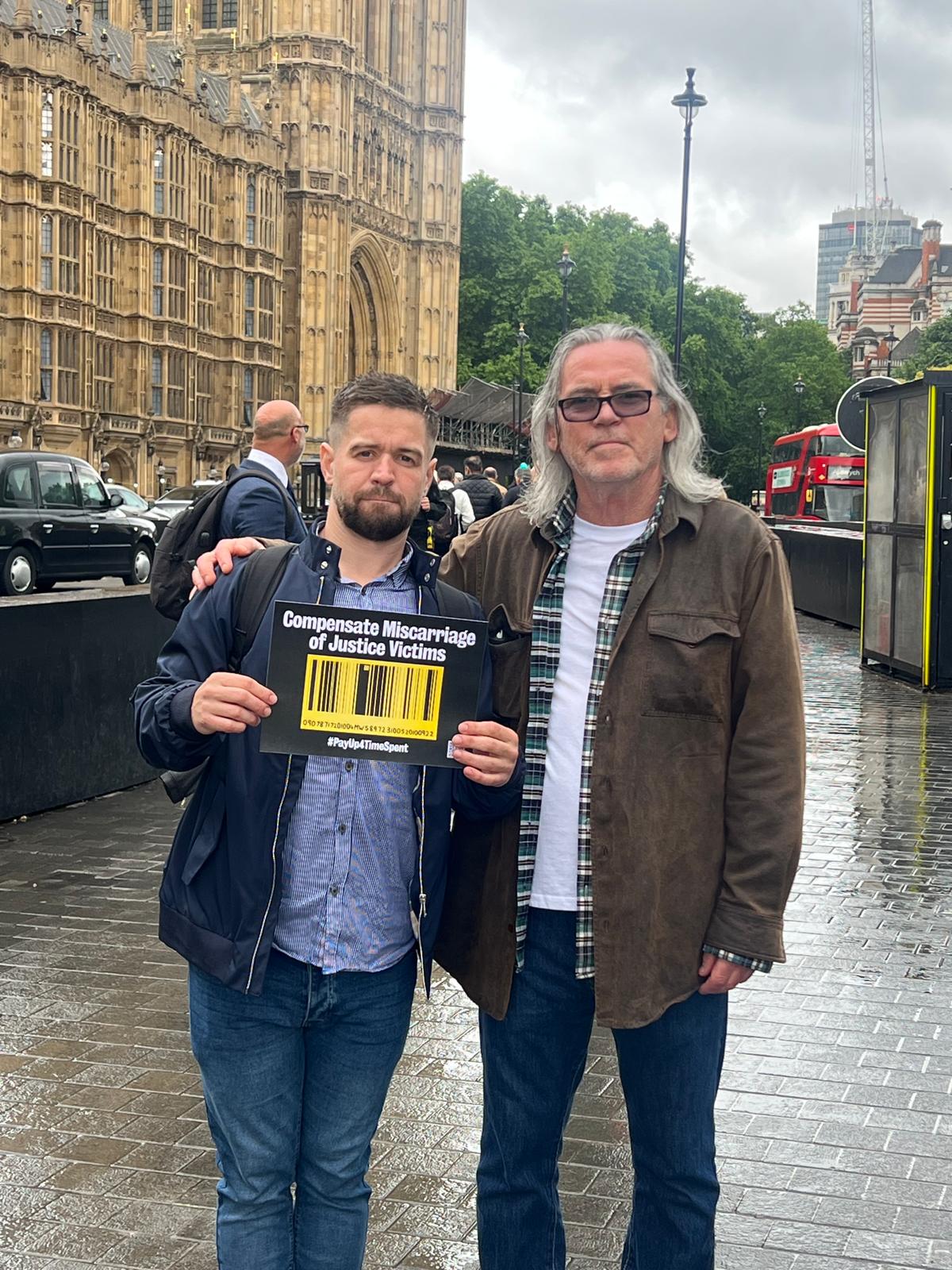
Sam Hallam (L) and Patrick Maguire
Patrick Maguire was just 13 years of age when he was arrested along with his entire family and convicted as the youngest of the Maguire Seven in 1976 in relation to the Guildford pub bombings. The prosecution claimed that they were running an IRA bomb factory from the north London kitchen table. Their convictions were overturned in 1991. You can read an interview with Patrick in PROOF magazine, issue 4.
He recalled being visited by his father when he was being held in a cell beneath the courtroom 2 of the Old Bailey just before his family was broken up and sent to various prisons. His father apologised to him for bringing him up to believe in the British justice system. ‘That was 50 plus years ago. I think he was right,’ he said.
Patrick Maguire said that the fight for justice was ‘never about the money’. ‘I was lucky if I got 50p to put in my money boxes as a kid,’ he said. ‘Money meant nothing to me. This was never about the money – but those in charge of made it so. They moved the goal posts and they made up some new rules.’
The case of Sam Hallam has featured many times on the Justice Gap since he had his conviction overturned in 2012. He also attended the launch. ‘It goes completely against what this country should stand for,’ he said.
Patrick Maguire visited Sam Hallam in prison in 2006 and campaign for his release. ‘My biggest sentence started when I was released -and Sam will have to go through this too,’ Maguire said when Hallam was freed in 2012. He was refused compensation and together with Victor Nealon took his case to Strasbourg.
Baroness Helena Kennedy KC talked of her own experience representing amongst others the Guildford Four. Turning to Patrick Maguire, she said: ‘I remember this boy when he was a boy. What we have to remember is what this does to people.’
The barrister represented Mary Druhan, who was convicted of arson and the murder of two alcoholics by causing a fire in a squat in Kingston. That conviction was overturned after one of the prosecution witnesses was linked to two other fires in derelict houses. Previously Kennedy has how described Mary Druhan ‘came blinking out into the light’ after 11 years in prison ‘totally institutionalised, unable to negotiate public transport and incapable of rebuilding her life without considerable help’. Her daughter committed suicide while she was in prison. ‘She was only out a few years before she died and often that is what happens,’ she said. ‘The toll has been so great that people just can’t survive on the outside.’
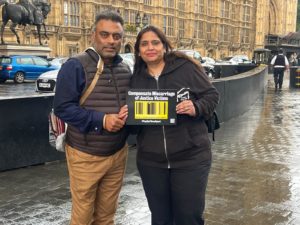 Seema Misra OBE, the former sub postmaster, spoke to parliamentarians about her experience caught up in the nightmare of the ‘Horizon’ scandal. She recalled November 11, 2010, her son’s 10th birthday, when she sentenced to 15 months in prison for theft and six months for each of six false accounting charges. ‘That was the day I lost faith in British justice. I said, if I can be sent to the prison for a crime never committed, anything is possible. Anything possible in this country.’
Seema Misra OBE, the former sub postmaster, spoke to parliamentarians about her experience caught up in the nightmare of the ‘Horizon’ scandal. She recalled November 11, 2010, her son’s 10th birthday, when she sentenced to 15 months in prison for theft and six months for each of six false accounting charges. ‘That was the day I lost faith in British justice. I said, if I can be sent to the prison for a crime never committed, anything is possible. Anything possible in this country.’
She was eight weeks’ pregnant with her second child and gave birth wearing an electronic tag. She’s now 13 years old. ‘[She] told me, mummy, if the Post Office put you back in prison, don’t kill yourself – you didn’t kill yourself because I was in your tummy. I said: ‘No, they won’t do that… We have a good legal system.’ The thing is a 13-year-old shouldn’t have to go through this. Everybody should have faith in the system. That’s what the fight is about.’
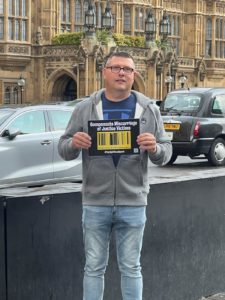 I’ve spent my life savings doing what the police should’ve done
I’ve spent my life savings doing what the police should’ve done
Brian Buckle was recently denied compensation despite having his conviction overturned via unanimous jury in just over an hour. His case was highlighted in parliament in March and the subject of a Westminster Hall debate tabled by the Plaid Cymru MP Ben Lake – as reported here.
‘My name is Brian Buckle,’ he began. ‘I spent five and a half years in prison for a crime I did not commit. In 2015 my world turned upside. Like all members of the public I believed in the justice system and I believed in the police. I thought they would do a proper investigation. But how wrong was I?’
Buckle was sentenced to 15 years on 16 counts of historical sexual offences before his conviction was overturned in September 2022. ‘I’m lucky. My wife stuck by me and my family stuck by me but you do have dark thoughts. Even when you’re an innocent person, you still have many dark thoughts about committing suicide.’
‘Why should you be going through this and putting your family through this? I’ve spent my life savings, spent inheritance money to prove what the police should’ve done.’ His application for compensation was rejected by the Ministry of Justice who told him that having carefully considered his application: ‘I do not consider your case demonstrates beyond a reasonable doubt that you did not commit the offences for which you were convicted.’
‘What more do you have to do to prove your innocent and to be told that you are not getting a penny. We’re living on the breadline now. We’re on universal credit. I had a really good job. I was paying tax and now I’m living off the government because of something that they’ve done to me and my family.’
#PayUp4TimeSpent
- The proportion of successful compensation claims fell from 46% pre-2014 to 7% – down 39%
- Between 2016 and 2024, the total number of successful compensation claims was 39, less than 5 per year on average
- The average award for compensation fell from £267,349.80 to £69,043.41, 74% down
- The average annual sum paid by the MoJ for all compensation awards combined fell from £5,988,635 to £297,587, down 95%
- The MoJ’s total expenditure in 2022/23 was £13.2 billion – its post-2014 average annual expenditure on compensation constitutes just 0.0023% of the MoJ budget
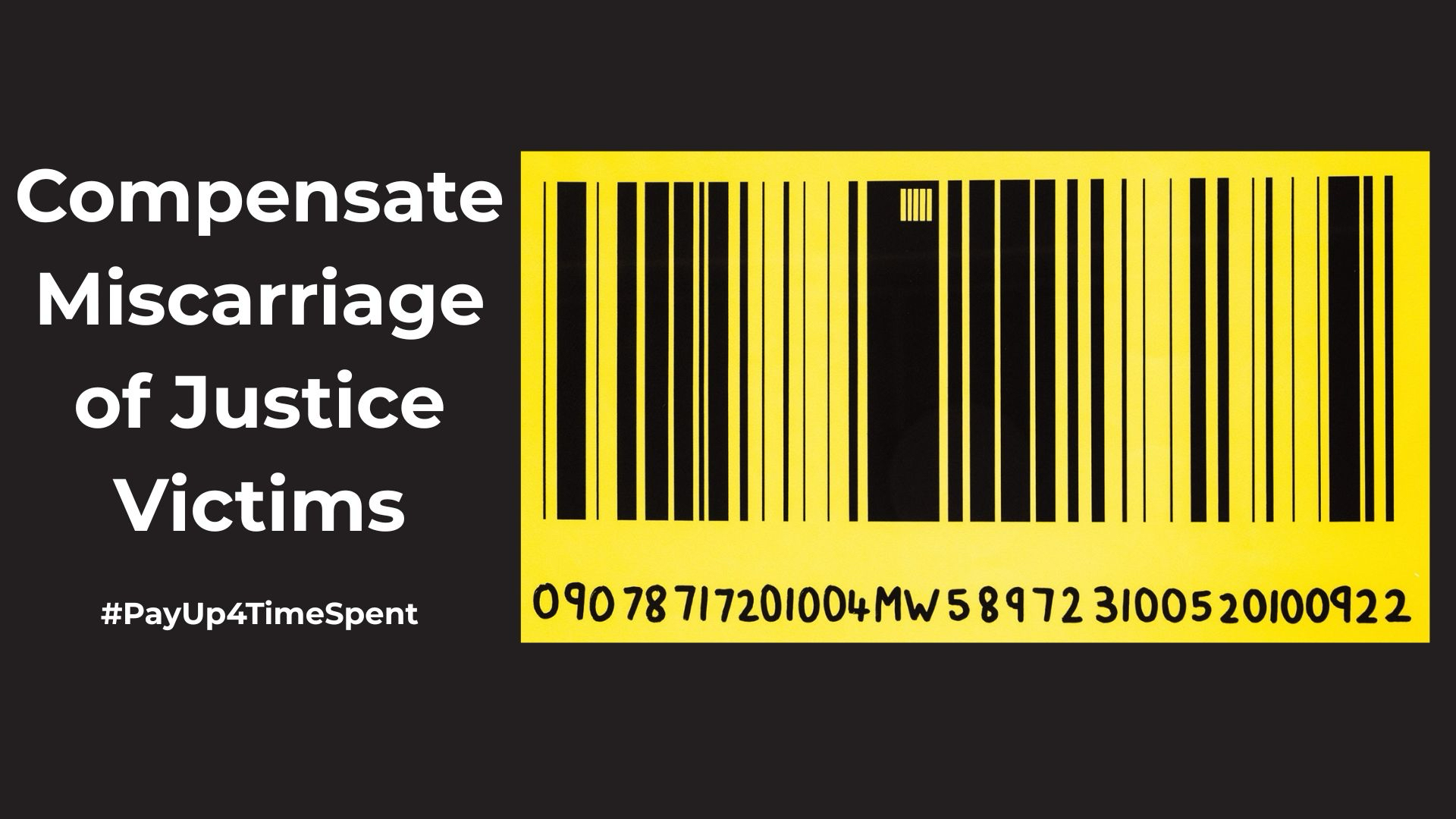
Support the Justice Gap, buy PROOF
